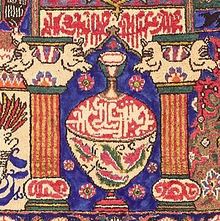Difference between revisions of "Kashmar Rug"
Jump to navigation
Jump to search
| Line 38: | Line 38: | ||
<!-- from Rugman Archive: https://web.archive.org/web/20080424001301/http://www.rugman.com:80/Content/kashmar.html --> | <!-- from Rugman Archive: https://web.archive.org/web/20080424001301/http://www.rugman.com:80/Content/kashmar.html --> | ||
[[Category:Khorasan Rug and Carpet]] | [[Category:Khorasan Rug and Carpet]] | ||
| − | |||
| − | |||
[[fa:قالی_کاشمر]] | [[fa:قالی_کاشمر]] | ||
Revision as of 09:47, 2 March 2020
| Kashmar Rug | |
|---|---|
 Design of Kashmar Rug (Rugman) | |
| General information | |
| Name | Kashmar Rug |
| Original name | قالی کاشمر |
| Alternative name(s) | Kashmar Carpet |
| Origin | |
| Category | City |
| Technical information | |
| Common designs | Afshan |
| Common colors | Crimson, Ivory, Blue, Green |
| Dyeing method | Natural, Synthetic |
| Pile material | Wool |
| Foundation material | Cotton |
| Knot type | Asymmetrical (Persian), Symmetrical (Turkish), Jufti |
Kashmar rugs originate from Kashan, located in the Province of Khorassan, just southwest of Mashad. It is reputed to produce some of the highest quality area rugs in eastern Iran in addition to being a collection point for Baluch tribal area rugs. The weaving of Kashmar rugs can be traced back to the 1500s. They are quite rare and historically very important. Much the same as books, Kashmar rugs tell the stories of the rich cultural life and history in the region. Kashmar is the home to many master weavers who use Persian knots to create their fine works of art.